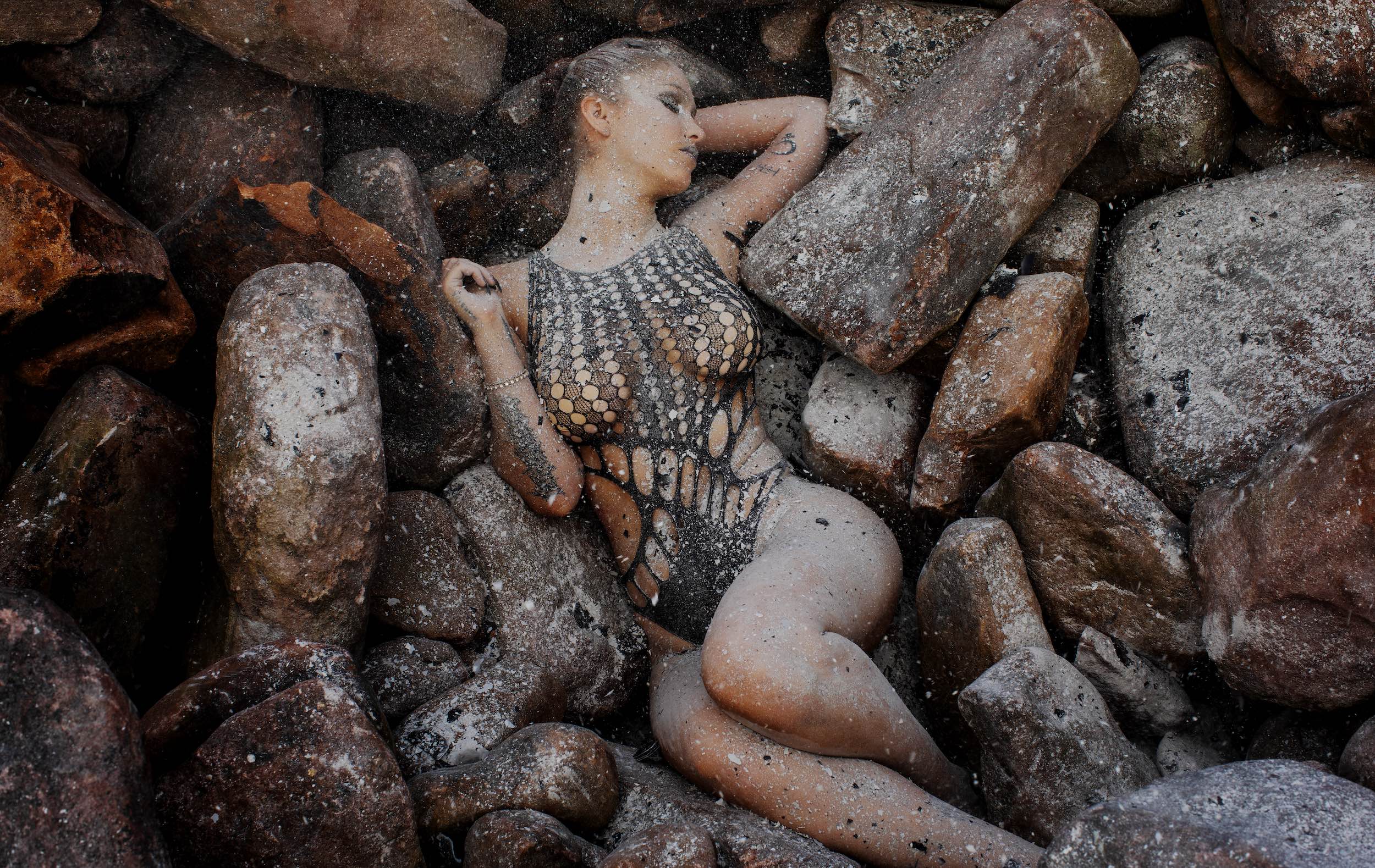A year ago yesterday, Alexandra Drewchin landed in Zaragoza, Spain to compose and workshop a record about immolation and rebirth for her wildly experimental pop project Eartheater. Over the course of ten weeks, she employed this concept of death and rebirth to deconstruct her past electronics-heavy discography in order to pen something completely unique to her, which wound up being the finger-picked acoustic guitar epic Phoenix: Flames Are Dew Upon My Skin. Since then, of course, we’ve largely seen the apocalyptic imagery referenced in both the record’s title and in the name of her project playing out on a global and national scale, as the coronavirus coincides with an ongoing climate crisis and some of the worst wildfires this country has ever seen.
“It gets under my skin,” she tells me of the uncanny parallels between her personal vision for the project and the disasters unfolding in 2020. “People keep sending me a collage of the Phoenix cover with images of the fires in California. Also the fact that the Ring of Fire is now becoming way more active than it’s been in a long time, and all these volcanoes are threatening right now, it’s a little freaky.” She uses the word “freaky” several more times over the course of our talk—in regard to the new recordings being based in part on compositions she wrote a while back for art films, which she later realized were about volcanoes, or about the geological lexicon used throughout the record imposing itself upon her brain immediately upon landing in Spain.
It’s also eerie to hear her sing about getting “caught up in the virus” on Phoenix track “Diamond in the Bedrock,” or to hear her otherworldly vocals recite the line “There goes my plan” on the album’s undeniable highlight, “freakily” called “Volcano,” as many of us scramble to put our lives back together in the wake of the ongoing pandemic. The use of acoustic guitar and classical accompaniment lining the track and the rest of the album also seems like it wound up being a prescient choice, she notes, as the patience and deeper listening required to process Phoenix has perhaps become more cultivated in a moment where we’re all confined to our apartments.
On the other hand, the tectonic shift in sound on Phoenix has produced some of the best entry points to the songwriter’s often-niche library, befitting of an album that’s wound up being a refreshingly optimistic take on the fiery doom we’ve seen on the news. “I think that songs like ‘How to Fight’ and ‘Volcano’ are sort of iconic in a sense that they’ll cross over through many different audiences, ages, and subcultures, but I think there’s a maturity there that has the experience and power to hold people,” she shares. “I hope that the more accessible parts will then seduce people to maybe open their ears to more obtuse sounds they wouldn’t usually be attracted by. That’s always been a fun mission of mine.”
With the record split nearly evenly between instrumental tracks and lyrical ballads, the accessibility she references could also very well apply to tracks like “Below the Clavicle,” which like “How to Fight,” offsets its lethargic, classical feel and very Eartheater-y sound collage with near rap-brag lyrics about personal transformation (“I know how to die,” she gloats on the latter). Meanwhile, the image of a phoenix—originating in a Prison Religion feature—pops up time and again. “I feel like I’ve always been making pop music, but I guess I’m just a freak on some levels that it always comes out sounding strange, or ‘experimental,’” she laughs, before singling out her track “Inhale Baby” from her last LP IRISIRI as her idea of a conventional pop song despite its lack of any sort of structure holding the song together. “But that’s part of the funny thing about setting out to make something—it does what it wants to do on its own. It’s always an interesting mirror into myself.” Or, in the case of Phoenix, into the world.
“Having learned the rules and then broken them again, it’s fun to put it back together. It’s this constant, very phoenix-like building, destroying, birthing type cycle within me.”
“Having learned the rules and then broken them again, it’s fun to put it back together,” she continues as we discuss the misconception that the urge for deconstruction is derived from an irreverence for the form, as prompted by a clipping. tweet posted earlier in the day of our talk. “It’s this constant, very phoenix-like building, destroying, birthing, killing, birthing, killing, building, destroying type cycle within me. I feel like with the sort of quote-unquote weirder music I’ve made, I’m still using those nostalgic tropes, still eroding and massaging and juxtaposing these same pop tropes.”
On Phoenix, these “quote-unquote weirder” ideas mostly emerge in the record’s instrumental interludes. Contrasting with the lyric songs boasting development, these tracks serve as the sounds of this growth—figuratively taking the form of the lush strings on “Metallic Taste of Patience,” which remarkably captures the mesmerizing sensation of watching lava flow, while the late-album “Goodbye Diamond” embodies the more painful, literal aspect of change, with the sounds of buzzsaws punctuating the skin-crawly soundscape. “Mercurial Nerve,” meanwhile maintains this sense of unease despite imbibing audio cues Thee Mt. Zion and echoed vocals reminiscent of Panda Bear. There’s as much pain in these tracks as there is—hopefully—familiarity.
“I think the right kind of universality in things is something that’s very healing to the world right now,” Drewchin shares. “My records are me building a smoke signal and being like, ‘Hey, I feel alone in the way that I am—who else is like me? Where are you? Can you find me?’ I think it did have a part in why I feel safe in my community now, because I did have a smoke signal, and I did communicate things that are really difficult to communicate about who I want to surround myself with.” She notes that Phoenix and Trinity, the mixtape she dropped in the interim between this album and IRISIRI, are about her personal experiences, but the inspiration for them were much more universal.

It was her intention on Phoenix to reconstruct herself in a way that allows for less improvisational collaboration than past electronic performances permitted for this very reason. “The beauty of a song that people fall in love with as an audience and then come together and sing the lyrics—that’s something I really look forward to experiencing in the future,” she says wistfully, noting that she’d had a live set all planned out in which she was excited to eschew the crutch of pre-recorded sound. “Part of my playfulness with the album was lining up the pieces for that to happen, while scrambling the electronic grid, which I very much gave into last summer when I made Trinity. A lot of my decisions are based on my getting over an impulse—Trinity was a dream come true in a lot of senses, but then I wanted the next thing to be a palate cleanser, to myself and to my fans.”
Replicating the tone of her record, Drewchin sounds optimistic about more than just the future of live music, noting from the beginning of our talk how lucky she was to wrap up this project just days before lockdown when I asked about how she’s coping with the pandemic artistically. Not only that, but she’s feeling pretty good about the future of our planet, her namesake, whether or not it continues to permit the presence of humans. “I really do believe the earth will be fine—she’ll just pop into an ice age and then a few thousand years laters pop back out, probably with a new array of new and exciting species,” she says. “A little piece of algae will get stimulated by some magical photosynthetic and emerge as, like, six-armed human or something. Actually maybe eight arms would be cooler.”
Risking a discouraging end to our conversation, I ask if she’s still feeling reborn one long year since putting the record together: “Every day has its own death moment and its own birth moment,” she muses. For now it’s just one of our meager bipedal legs in front of the other. FL







